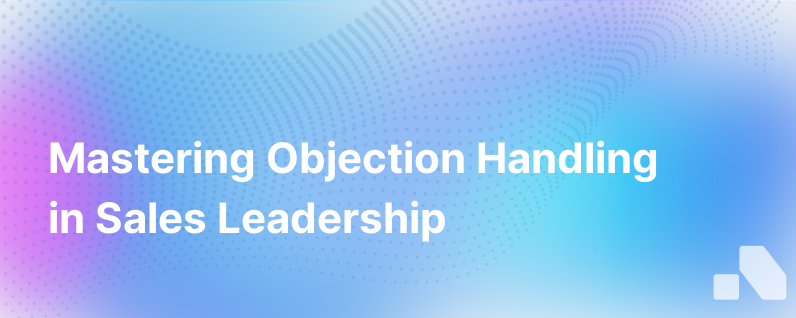Objection Handling
Published on November 3, 2023 by Sawyer Middeleer
Objection handling is a core skill every sales reps should master. Complaints, objections, and concerns from potential customers are hurdles that can completely transform the success of a sales pitch. Objections signal that the prospect needs more information before making a purchasing decision and create an opportunity for deeper engagement rather than a barrier to the sale.
Thus, leveraging strategic objection handling techniques will help to convert potential "nos" into definitive "yeses". But how can you overcome these objections effectively? In this blog post, we'll unpack the process step by step, providing insights and tips for successful objection handling.
Understanding Objections
Sales objections can be categorized into four primary types:
1. Price: One of the most common objections is cost. The prospect may believe the price doesn't match the value or they may simply not have the budget.
2. Authority: Here the prospect may not have decision-making power, or they need to consult with another party before making a decision.
3. Need: Perhaps the prospect doesn't see the need for your product or service or believe they can find a solution elsewhere.
4. Timing: Prospect believes it's not the right time to make a purchase or commit to a new product or service.
Understanding the nature of these objections can help you devise a suitable response strategy.
The 4-Step Process to Handling Objections
Navigating objections don't have to be daunting. Here is a simple four-step approach:
1. Listen: Allow your potential customer to voice their concerns without interruption. Active listening will make them feel heard and provide you with valuable insights.
2. Understand: Seek clarification if necessary. Ask probing questions to ensure you fully comprehend their concerns. This step can also help you distinguish between actual objections and mere complaints.
3. Respond: Address their concern directly, provide additional information, share examples, or propose a solution. The response should be personalized, as canned responses rarely do the trick.
4. Confirm: Ensure the prospect is satisfied with your response before proceeding. You can ask follow-up questions like, "Does that make sense?" or "Did that help?" to confirm you've successfully handled the objection.
Pro Tips for Handling Common Objections
Let's stress on how to handle the four described common objections:
1. Overcoming Price Objections: Understand their budget constraints and quantify the value of your product or service. You may also suggest flexible payment options or packages, if available.
2. Handling Authority Objections: Ask the prospect to include the decision-maker in your discussions if possible. If not, understand what information the decision-maker needs to make a choice and provide that through the prospect.
3. Addressing Need-Based Objections: Demonstrate how your product or service can solve a problem they are facing. Free trials or demos can effectively showcase tangible benefits.
4. Navigating Timing Concerns: Explore their timeline and understand why they may be hesitant. There might be a real impediment you can't control, or they might just need a bit more convincing about the urgency of their need.
5. Use Product Examples or Case Studies: Sharing stories of how your solution resolved similar problems for other clients can be compelling. People relate to stories and evidence of success.
Mistakes to Avoid in Objection Handling
1. Not Letting the Customer Speak: Allow your prospect to fully articulate their objections. Cutting them off or immediately jumping into a solution can make them feel unheard.
2. Making Assumptions: Never assume you know what the objection is. Always ask probing questions to understand their concern fully.
3. Lack of Empathy: Show understanding and acknowledge their concerns, avoid overtly defensive or dismissive responses.
Convert "No" to "Yes" with Advanced Objection Handling In essence, handling objections is indeed an art and a vital part of being successful in sales. Objections are not deal breakers; they are opportunities for better understanding and engagement with your prospects. They serve to open dialogue channels and clarify misconceptions, rather than shutting conversations down.
Combine active listening, empathy, a clear understanding of your product, and a solution-focused mindset, and you'll have a formula for resolving objections effectively, ultimately leading to more closed deals.
Lastly, remember that no amount of objection handling can substitute for a genuinely beneficial product or service. Aomni, as a sales enablement platform, can equip your sales team with real-time account research, actionable competitive insights, and personalized sales content swiftly, empowering them to handle objections more effectively, and more. The goal is always to facilitate your prospect's journey from confusion or skepticism to clarity and conviction, thereby transforming potential sales objections into business growth opportunities.